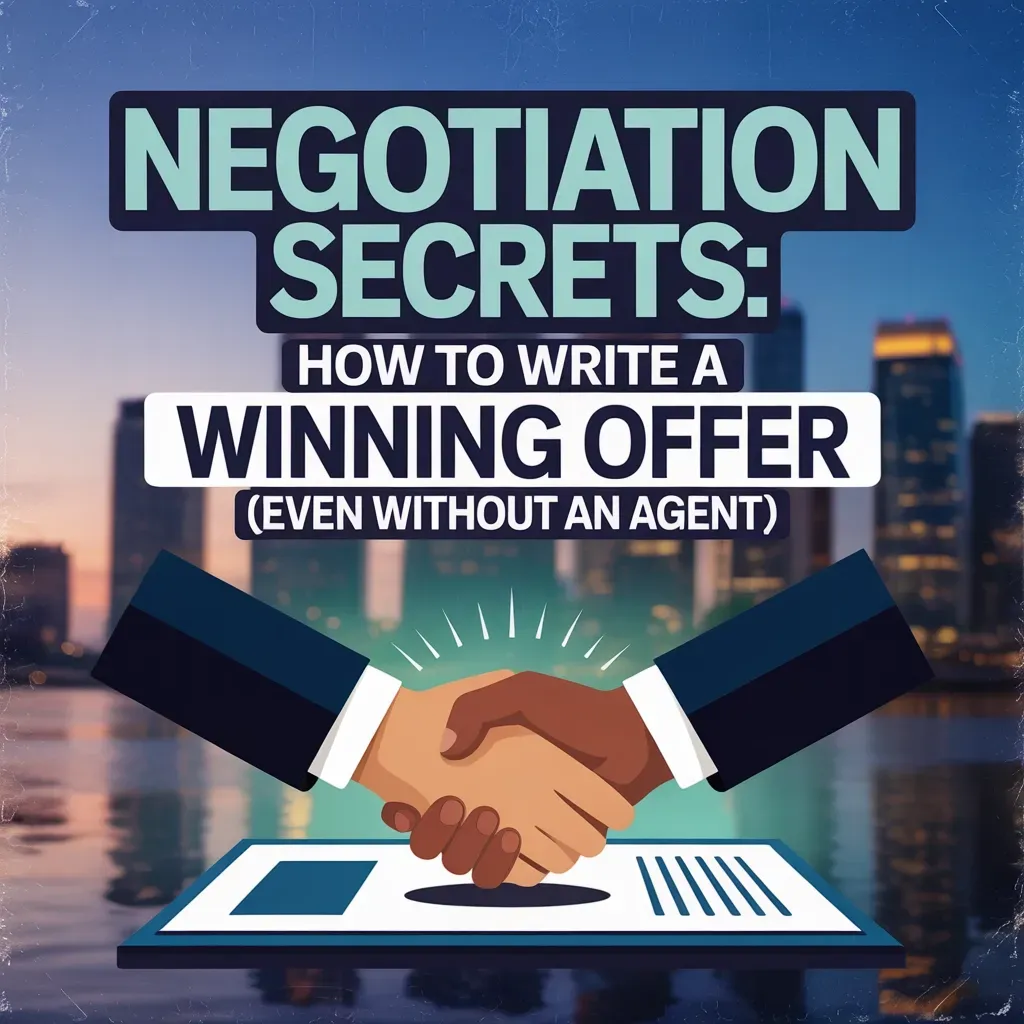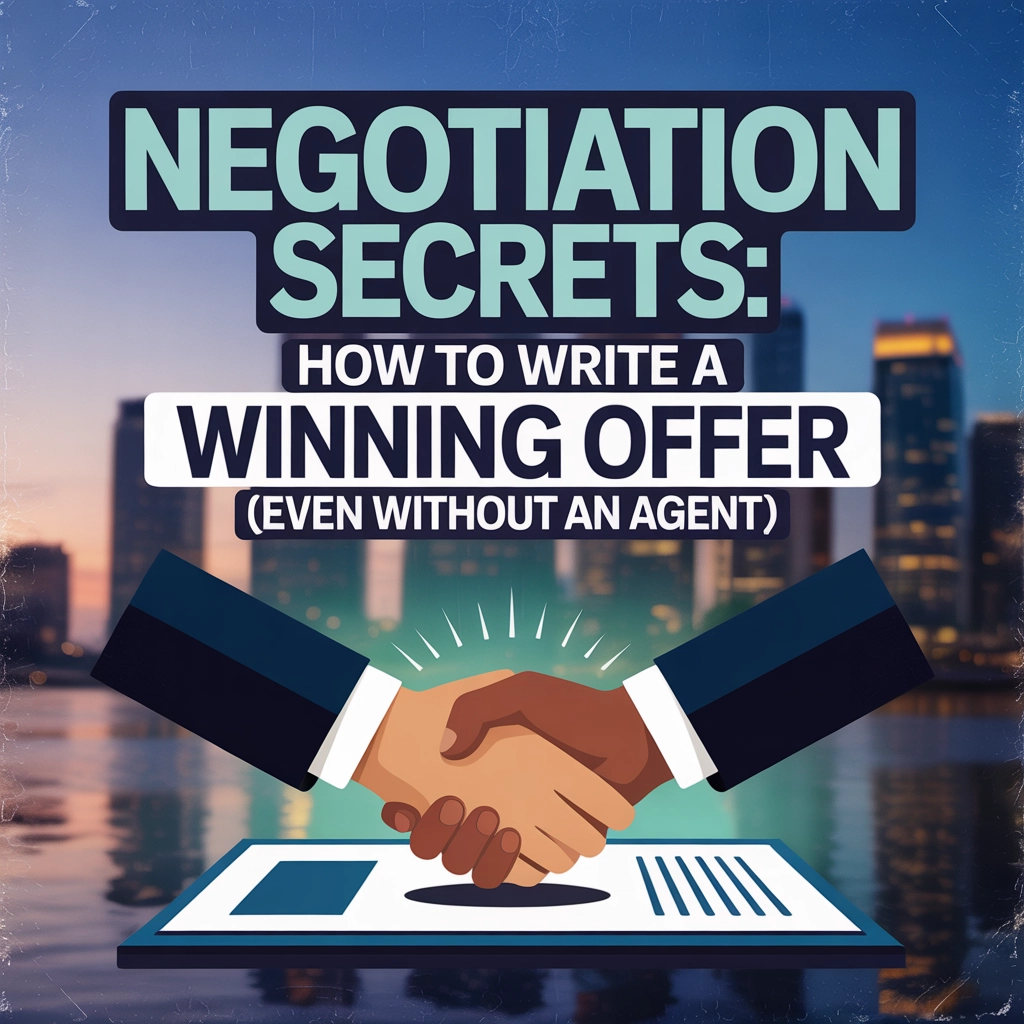
Write a Winning Offer
Negotiation Secrets: How to Write a Winning Offer (Even Without an Agent)

Writing a winning offer without an agent isn't just possible: it's profitable. You'll save thousands on commissions while gaining complete control over your negotiation strategy. But success requires insider knowledge that agents typically guard closely. Here's your complete playbook for crafting offers that sellers can't refuse.
Research the Property's Market Timeline
Days on market reveal everything. Properties listed under 10 days signal high demand and competitive bidding. You'll need to move fast and offer at or above asking price. Properties sitting 30+ days indicate motivated sellers: your negotiation sweet spot.
Check the listing history. Has the price been reduced? Multiple price drops scream desperation. A property reduced from $450,000 to $425,000 to $400,000 tells you the seller will likely accept $385,000 with the right approach.
Seasonal patterns matter. Homes listed in winter (November-February) often feature more motivated sellers. School year constraints and holiday expenses create urgency that works in your favor.
Use this timeline intelligence to calibrate your offer:
0-15 days: Offer asking price or slightly above
16-30 days: Offer 2-5% below asking
31-60 days: Offer 5-10% below asking
60+ days: Offer 10-15% below asking with confidence

Uncover the Seller's True Motivation
Ask why they're selling. This single question transforms your negotiation power. Common motivations and how to leverage them:
Job relocation: Time-sensitive sellers who need quick closings. Offer flexibility on their timeline in exchange for price concessions.
Divorce proceedings: Often the most motivated sellers. They need to liquidate assets quickly and may accept below-market offers for certainty.
Financial distress: Look for clues like deferred maintenance or urgent sale language. These sellers prioritize speed over maximum price.
Downsizing retirees: Usually flexible on timeline but want fair market value. Focus on your reliability as a buyer rather than lowball pricing.
Investment properties: Numbers-focused sellers. Present your offer with clear financial benefits like quick closing or cash equivalent terms.
Research the seller's history. Check public records to see how long they've owned the property. Recent purchases (under 2 years) might indicate flipping or financial pressure. Long-term ownership (10+ years) usually means they have substantial equity and less desperation.
Master the Art of Offer Expiration
Set strategic deadlines. Your offer expiration creates urgency that forces decisions. Use these timeframes:
Hot markets: 24-48 hours maximum
Balanced markets: 3-5 days
Buyer's markets: 1 week maximum
Weekend psychology works. Submit offers on Thursday afternoon with Monday expiration. Sellers spend the entire weekend thinking about your offer, building psychological investment.
Create scarcity. Include language like: "This offer reflects current market conditions and financing rates available through [date]. Extended consideration may require offer adjustment."
Never extend without concessions. If sellers request more time, respond with: "We can extend 48 hours, but the price will need to adjust to $X to reflect continued market exposure and opportunity cost."

Intelligence Gathering on Competing Offers
Ask directly about other offers. Most sellers will reveal this information when asked professionally: "Are there currently any other offers under consideration? This helps us structure our proposal competitively."
Timing reveals competition. If you're told to submit "highest and best" immediately, multiple offers exist. If you're encouraged to tour again or meet the sellers, you might be the only serious buyer.
Watch showing activity. Drive by the property at different times. Constant traffic indicates competition. Empty showings suggest you have negotiation room.
Leverage your advantages over competing offers:
Cash buyers: Highlight no financing contingencies
Local buyers: Emphasize market knowledge and community investment
Quick closers: Offer 15-day closing versus standard 30-45 days
Flexible buyers: "We can accommodate your preferred closing timeline"
Position yourself uniquely. Instead of just matching other offers, differentiate: "While other buyers might offer similar prices, we provide [unique advantage] that ensures a smooth transaction for your family."
Timeline Negotiation Strategies
Match seller preferences when possible. Ask: "What's your ideal closing timeline?" Then structure your offer accordingly:
Seller wants quick closing (under 30 days):
Offer cash or conventional loan pre-approval
Waive unnecessary contingencies
Include "time is of the essence" language
Consider rent-back arrangements if needed
Seller needs extended timeline (60+ days):
Offer longer closing periods
Include rate lock protection language
Propose lease-back options
Consider delayed possession agreements
Build flexibility into your offer. Include language like: "Buyer can accommodate closing between [earliest date] and [latest date] based on seller's preference and property preparation needs."
Use timeline as a negotiation tool. Fast closings have monetary value. Calculate the carrying costs you're saving the seller (mortgage, taxes, insurance, utilities) and factor this into your price negotiations.

Contract Terms That Close Deals
Earnest money sends signals. Standard deposits (1-2% of purchase price) show basic commitment. Serious buyers offer 3-5% or higher. In competitive markets, high earnest money can overcome slightly lower purchase prices.
Contingency strategy wins or loses deals:
Inspection contingencies: Essential for protection, but negotiate timeframes. Offer 5-7 day inspections instead of standard 10-14 days.
Financing contingencies: If pre-approved, consider waiving or using "mortgage commitment" language instead of generic financing contingencies.
Appraisal contingencies: In competitive markets, consider appraisal gap coverage: "Buyer will cover appraisal shortfall up to $X amount."
Personal property negotiations: Don't nickel-and-dime over appliances or fixtures. Include desired items in your initial offer or let smaller items go to maintain goodwill.
Closing cost strategies:
Ask sellers to cover specific costs rather than generic "closing costs"
Request credits for immediate repairs instead of demanding fixes
Consider higher purchase price with seller credits for tax advantages
The Psychology of Offer Presentation
Lead with your strongest points. Open your offer letter with your most compelling advantage: pre-approval letter, cash position, flexible timeline, or local connection to the community.
Include personal touches without oversharing. Brief, genuine statements about why you love the home create emotional connection without appearing desperate.
Professional presentation matters. Clean, organized offer packages suggest reliable buyers who will handle the transaction smoothly.
Follow up strategically. After submission, wait 24-48 hours, then check in professionally: "Wanted to confirm you received our offer and see if you have any questions we can address."
Closing the Deal
Negotiate from strength. Even without an agent, you control significant value: the eliminated commission. In many markets, this represents 2.5-3% of the home's value that can be shared as savings.
Present alternatives, not ultimatums. Instead of "take it or leave it," offer: "We can structure this as [$X at current terms] or [$Y with modified timeline/contingencies]."
Know your walkaway point before you start. Emotional attachment kills deals. Set your maximum price, minimum acceptable terms, and timeline requirements before viewing properties.
Prepare for counteroffers. Sellers usually counter rather than reject entirely. Have your response strategy planned for common scenarios: higher price requests, timeline changes, or contingency modifications.
Remember, buying without an agent saves you thousands while putting you in complete control of your negotiation strategy. With proper preparation and strategic thinking, you'll craft offers that sellers accept while protecting your interests and maximizing your savings.
Ready to put these negotiation secrets to work? At Unbeatable Loans, we provide the financing expertise you need to make competitive offers that close (without the agent commissions.)
